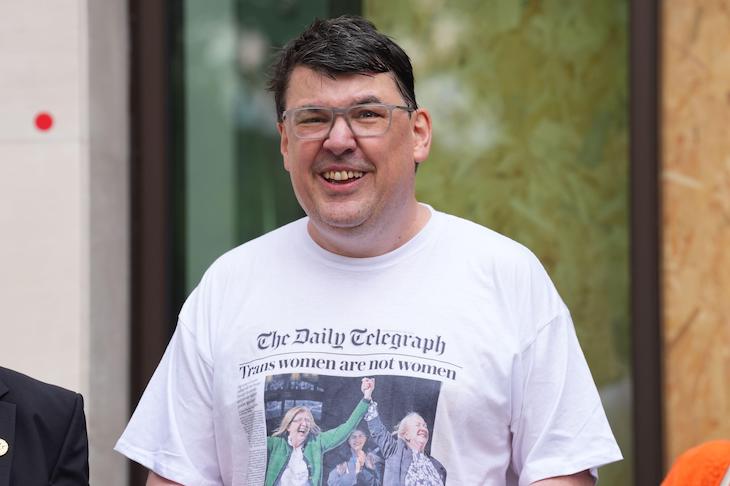Well, if they’re arresting comedians, at least Nish Kumar is safe. Graham Linehan, not so much. The British like to sniff that Americans don’t get irony. Arresting a comedian fresh off the plane from the US after months of dismissing US concerns about freedom of speech is one way to teach them. Not only was Linehan detained by the police for tweets attacking an establishment-approved ideology, he was subsequently bailed on the condition that he not post any further tweets. Britain is never beating the allegations.
I’m a Glinner (his X handle) sceptic. I began writing in opposition to gender identity ideology in 2019, and have the scars to show for it, but while my philosophical opposition is absolute my handwringing softboy liberalism makes me queasy about Linehan’s full-throated approach. It’s not about tone-policing: I think people who consider themselves trans should be loved, respected, and treated with dignity.
Gender ideology is harmful in all cases, but the same is not true of the people caught up in it. They shouldn’t be insulted, but nor should they be lied to. Their needs should be accommodated, but not at the expense of women’s sex-based rights. I am not oblivious to malign actors within the movement; those who harass and threaten women should be resisted fiercely. But Linehan’s nuclear rhetoric is not for me.
I say all this not to beg the crocodile to eat me last, or at least later, but because I write this in fulsome, uncompromising solidarity with Graham. He says: ‘I was arrested at an airport like a terrorist, locked in a cell like a criminal, taken to hospital because the stress nearly killed me, and banned from speaking online – all because I made jokes that upset some psychotic crossdressers.’
Every word of that sentence is outrageous. It describes, as Linehan says, ‘a country that is hostile to freedom of speech’. And when he claims radical trans activists have ‘turned the police into their personal goon squad’, I’m hard-pressed to disagree, especially if, as Linehan claims, the interviewing officer used trans activist language about sex being ‘assigned at birth’. (Sex is observed at birth; ‘assigned’ is intended to imply someone had the ‘wrong’ sex imposed on them.) Met commissioner Sir Mark Rowley has urged a review of current legislation, and well he might given the reputational damage done to his force and others in the course of what he characterises as ‘policing toxic culture wars debates’. That makes the police sound like victims when they have often given the impression of having been captured by the gender ideology.
According to Linehan’s account, the police interrogated him on three tweets from April. One said: ‘I hate them. Misogynists and homophobes. Fuck em.’ (Being more respectful, I would have written ‘fuck they/them’.) Another included an image of an apparent trans protest and the words ‘a photo you can smell’. The third, and the supposedly contentious one, said: ‘If a trans-identified male is in a female-only space, he is committing a violent, abusive act. Make a scene, call the cops and if all else fails, punch him in the balls.’ I can’t endorse this advice. You shouldn’t punch people in the balls, unless they ask nicely, and I doubt the police will turn up over a bloke in the ladies’ bogs at M&S, unless of course you tell them he’s in there tying an England flag to the Tampax machine.
Linehan says the punch tweet was ‘a serious point made with a joke’, but even if it wasn’t, suggesting that a hypothetical man in a hypothetical encounter in a hypothetical room be punched only threatens public order in a country which defines public order so expansively as to leave almost no space for offensive or even controversial speech. The investigation also relates to tweets posted in April. If there was a threat to public order, it doesn’t seem to have been imminent. Absent any further developments or additional context, the more charitable reading is that the police were overzealous in the exercise of their duties in a way not conducive to the public interest. The less charitable reading is that a police force which was until very recently aligned with one of the chief promoters of gender ideology arrested a famous critic of that ideology. I incline towards the former explanation but I can see why others wouldn’t.
The time for tinkering is long gone
Sir Mark says we need ‘greater clarity’ and ‘common sense’ in this area. With respect, no we don’t. It’s too late for that. The Public Order Act 1986 and the Communications Act 2003, and not only those Acts, have come to be applied in a way that is destructive of liberty. This Ed West piece from last January provides plenty of examples. One case after another of lives turned upside down, careers ruined, legal bills racked up, health damaged by the state’s overbearing regulation of speech. There have been ample opportunities to clarify and introduce common sense, but none of the major parties have taken them. Instead, they have tightened the screw on the expressive liberty of the citizenry.
The time for tinkering is long gone. We need to tear up the current legal framework governing limits on speech and legislate US-style protections as provided by the First Amendment to the US Constitution. That sentence would set on edge the teeth of many a legal scholar or practitioner in this country, and I’m afraid my response to that is: tough. Sweeping aside a body of law which has developed over a sustained period of time and replacing it with legislation modelled on the laws of another country might well be a bad idea. There are significant differences between the US and the UK in constitutional arrangements, legal conventions, and legislative history. But is it a worse idea than continuing on the authoritarian path successive governments have pursued? I think not.
The British are not a liberty-minded people when it comes to expression; we are a nation of curtain twitchers, watershed monitors, Ofcom callers and ban enthusiasts. Only when the state takes the proverbial, the Linehan incident being a prime example, does the British public get their backs up. It wouldn’t be long before they were clamouring for First Amendment-style protections to be repealed because some skinhead incited racial hatred or a men’s rights activist penned a Hustler v. Falwell type parody of a feminist politician. Much though I would deplore such speech acts, I recognise that a legal regime which permits them is one which permits the greatest liberty of political, social, religious, and artistic expression. Maybe the public would never come around to my perspective, but after a generation or so of elite-driven speech authoritarianism I reckon a generation of elite-driven libertarianism is in order. Just to balance things out.
We need to learn to distinguish between speech we find offensive or hateful, which however objectionable ought to be shielded from prosecution, and those types of expression which ‘tend to incite an immediate breach of the peace’, which should generally not be shielded. This battle is probably already long since lost to the restrictionists but expressive liberals should battle on, happy warriors in the cause of everyone, even Graham Linehan, being able to speak freely.








Comments